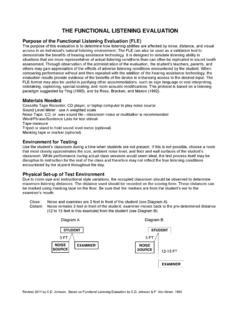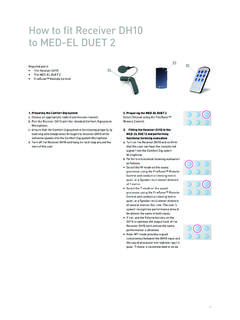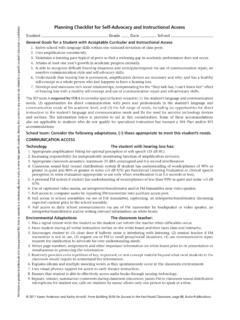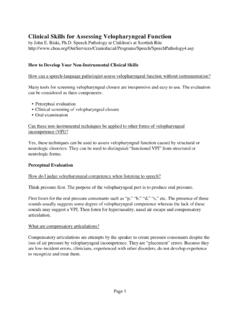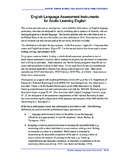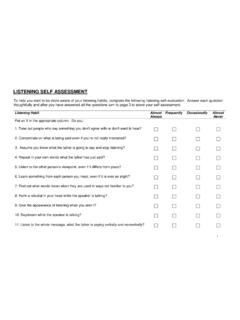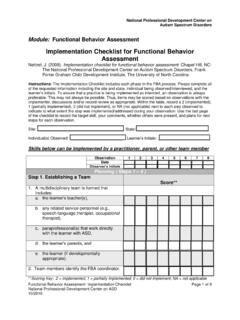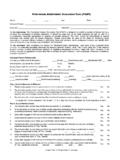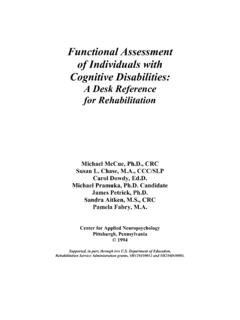Transcription of MINNESOTA COMPENSATORY SKILLS CHECKLIST
1 Updated 2010 MINNESOTA COMPENSATORY SKILLS CHECKLIST FOR STUDENTS WITH HEARING LOSS Rationale 1 Understanding Hearing Loss 4 Amplification Management 6 Resources/Technology 9 Communication Strategies 12 Personal/Interpersonal 14 Student Name _ _____ ID# _ __ Page 1 RATIONALE Since the passage of Public Law 94-142, the Education for All Handicapped Children Act of 1975, there has been a surge of interest in knowledge and understanding of children with mild to severe hearing loss. COMPENSATORY SKILLS are those needed by students with hearing loss to access learning in a manner equal to that of their hearing peers. These SKILLS are sometimes difficult to address in an integrated setting where the focus of instruction is on academic programs. Specific needs of students with hearing loss are often overlooked because they appear to function similarly to their hearing peers.
2 Students with hearing loss are generally in the mainstream, both in school and in daily life. Consequently, students with hearing loss may feel isolated and different. This COMPENSATORY SKILLS CHECKLIST was developed to meet the specific needs students with hearing loss. These SKILLS are necessary for students with hearing loss to understand the impact of their hearing losses on their daily lives. This COMPENSATORY SKILLS CHECKLIST was developed collaboratively by the Deaf/Hard-of-Hearing Itinerant Teachers from Minneapolis Public Schools, Saint Paul Public Schools, Independent School District 287 and the MINNESOTA Department of Human Services Deaf/Hard-of-Hearing Services Division. This CHECKLIST was inspired by the work done through the Michigan State Board of Education, Special Education Program Outcomes Guide: Hearing Impairment. It was developed as a model for itinerant teachers to use with hard-of-hearing students; however, it can be adapted for use with any population with hearing loss.
3 The CHECKLIST was revised by a workgroup of teachers of the deaf/hard-of-hearing convened by MDE in March, 2010. HOW TO USE THIS CHECKLIST 1. This CHECKLIST is a guide/tool for educational teams. Feel free to adapt it according to student needs. 2. This CHECKLIST was developed as a hierarchy of SKILLS specific to students with hearing loss from kindergarten through twelfth grade. 3. This CHECKLIST is not an evaluation . It is a tool for educational teams to use with students with hearing loss. Teams are encouraged to use the CHECKLIST to identify and address individual student needs. 4. For students in twelfth grade should be able to complete all tasks independently as they relate to the three areas of transition. Page 2 MINNESOTA COMPENSATORY SKILLS CHECKLIST for Students With Hearing Loss Name _ _____ Parent/Guardian _ _____ Birthdate _ _____ Primary Home Language _ _____ Amplification Used RT Ear _ _____ LT Ear _ _____ DATE EVALUATOR COMMENTS GRADE SCHOOL YEAR EVALUATOR Kindergarten First Second Third Fourth Fifth Sixth Seventh Eighth Ninth Tenth Eleventh Twelfth Page 3 DATE EVALUATOR COMMENTS COMPENSATORY SKILLS for Students with a Hearing Loss UNDERSTANDING HEARING LOSS Page 4 KEY / emerging X mastery NA not applicable SKILLS and KNOWLEDGE /, X, or NA DATE EMERGING SKILLS .
4 GRADES K - 2 Recognizes that he/she has a hearing loss Indicates better ear, if applicable Aware of needs related to hearing loss ( , must listen, look to speaker, must be seated strategically) Recognizes audiogram from other charts Aware of basic information on an audiogram Aware that he/she is not the only one who has a hearing loss Aware that environmental sounds may damage one s hearing BASIC: GRADES 3 - 5 Knows the three parts of the ear (outer, middle, inner) Knows types of hearing loss (conductive, sensorineural, mixed) Knows cause of his/her hearing loss Knows age of onset and age of identification Understands the basic language of an audiogram Identifies the L or R markings on an audiogram Aware of the basic terms related to hearing loss Refers to self as hard-of-hearing Knows that his/her hearing loss is stable, progressive, or irreversible Recognizes that people with hearing loss have a variety of communication strategies (Speech, ASL, Signed English, Cued Speech) Aware of the fact that deaf/hard-of-hearing, and hearing people are similar in almost every way Explains hearing loss and individual needs to teachers and peers Aware of ways to protect and conserve hearing INTERMEDIATE.
5 GRADE 6 - 8 Identifies parts and functions of the ear Identifies his/her type and degree of hearing loss Explains audiogram in terms of his/her functional hearing Explains aided and unaided hearing loss Understands speech reception threshold scores shown on an audiogram Talks about his/her hearing loss with peers/others COMPENSATORY SKILLS for Students with a Hearing Loss UNDERSTANDING HEARING LOSS Page 5 KEY / emerging X mastery NA not applicable Understands that feelings about hearing loss may impact self Accepts his/her hearing loss and knows that it may/may not go away Aware of myths and misconceptions about hard-of-hearing individuals Knows that hard-of-hearing people are capable of major accomplishments Demonstrates the importance of protecting hearing Knows that loud sounds are hazardous to hearing ADVANCED: GRADES 9 -12 Demonstrates knowledge and use of accommodations related to personal hearing loss Knows hearing loss type, degree, and etiology Demonstrates knowledge of hearing test and audiogram Recognizes that people may respond to him/her differently due to hearing loss Indicates what he/she hears/understands across all environments Makes and keeps appointments with ENT, audiologist, physician, etc.
6 Reads biographies of successful hard-of-hearing individuals Knows and demonstrates hearing conversation strategies Knows the different ways people with hearing loss have been identified and can discuss how that has changed over time Aware of self-identification options available to people with hearing loss (Deaf Community, Deaf Culture, hearing world, both) Talks about ways that persons with hearing loss identify themselves Accepts/adjusts to hearing loss Understands that problems are involved in adjusting to life s experiences whether or not a person has a hearing loss Mentors younger students with a hearing loss about ways of adjusting to hearing loss Aware of and identifies groups available for people with hearing loss (deaf, Deaf, hard-of-hearing, person with hearing loss) Uses products related to hearing protection and conservation COMPENSATORY SKILLS for Students with a Hearing Loss AMPLIFICATION MANAGEMENT Amplification systems include cochlear implants, hearing aids, FM, etc.
7 Page 6 KEY / emerging X mastery NA not applicable SKILLS and KNOWLEDGE /, X OR NA DATE EMERGING SKILLS : GRADES K - 2 Understands how hearing aids/amplification systems help Accepts and utilizes hearing aids/amplification system, as directed by adult Inserts/removes earmolds appropriately with adult assistance Puts on/takes off amplification equipment with adult assistance Asks adult for help with hearing aid/amplification system Indicates when amplification equipment is not working Stores hearing aids correctly when not in use Checks batteries in aids with battery tester and changes batteries as needed with adult assistance Cleans/cares for personal earmolds with adult assistance Knows how to turn on/off amplification and use controls Gives teacher/speaker/peer microphone, with reminders, if necessary Understands that hearing aids/amplification equipment are expensive and valuable Wears amplification equipment consistently Charges FM daily BASIC: GRADES 3 - 5 Uses amplification use consistently Explains why and when hearing aids/amplification system is needed Gives speaker microphone independently Ensures speaker is utilizing microphone appropriately Ensures that microphone is synched with amplification Continues to charge FM daily Cleans/cares for earmolds with increased independence on a routine basis Knows size of batteries and keeps supply at school Manages all controls properly (on/off, environment, teacher mic, t-coil, computer patch cord, etc.)
8 Begins to troubleshoot when amplification is not working (static sounds, intermittent output, signal COMPENSATORY SKILLS for Students with a Hearing Loss AMPLIFICATION MANAGEMENT Amplification systems include cochlear implants, hearing aids, FM, etc. Page 7 KEY / emerging X mastery NA not applicable spill-over ) Indicates when auditory stimulus is not loud enough Indicates when background noise interferes with audition Understands that amplification system is expensive and valuable Requests help with amplification systems when necessary Knows features of personal hearing aids Names main parts of hearing aids/amplification system and their purpose INTERMEDIATE: GRADES 6 8 Uses hearing aids/amplification system options for various learning situations Monitors and maintains own equipment on a daily basis Knows products available to protect hearing aids from moisture Troubleshoots amplification system consistently by solving minor problems Requests help with monitoring amplification systems when necessary Understands advantages of wearing hearing aids/amplification in classroom Understands information shown by functional listening evaluation Knows approximate costs of hearing aids/amplification systems Knows size and cost of batteries and where to get them Describes amplification used by hard-of-hearing people (hearing aids, cochlear implant, assistive listening devices)
9 Explains how FM microphone works Gives/passes/picks up microphone from teachers/among peers, when necessary Seeks advice/assistance in managing amplification ADVANCED: GRADES 9 -12 Requests appropriate amplification accommodations Refines troubleshooting SKILLS related to problems with amplification systems Describes how hearing aids work Knows amplification options in varying academic/community situations ( , personal and assistive listening devices) COMPENSATORY SKILLS for Students with a Hearing Loss AMPLIFICATION MANAGEMENT Amplification systems include cochlear implants, hearing aids, FM, etc. Page 8 KEY / emerging X mastery NA not applicable Knows how to use hearing aid or cochlear implant processor with t-coil and direct audio input in conjunction with assistive listening devices Knows where and when to have hearing/hearing aids re-evaluated Knows how to pursue purchase of hearing aids (costs, features)
10 Understands that educational audiology services end with high school graduation Develops a plan for audiology/amplification services post-high school Contacts educational audiologist for monitoring hearing status and to maintain amplification equipment Recognizes and states consequences of use/non-use of hearing aids/amplification system Knows how to obtain financial assistance for getting hearing aids, if necessary Understands the cost of purchasing and maintaining hearing aids, plus warranty and service plans Keeps self updated on new amplification technology Knows difference between licensed audiologist, hearing aid dispenser, and hearing aid dealer COMPENSATORY SKILLS for Students with a Hearing Loss RESOURCES AND TECHNOLOGY Page 9 Updated 3/2010 KEY / emerging X mastery NA not applicable SKILLS and KNOWLEDGE /, X OR NA DATE EMERGING SKILLS .
